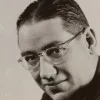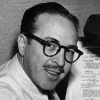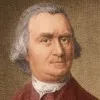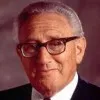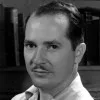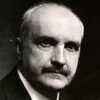MORE: Well … I believe, when statesmen forsake their own private conscience for the sake of their own public duties … they lead their country by a short route to chaos.
Robert Bolt (1924-1995) English dramatist
A Man for All Seasons, play, Act 1 (1960)
(Source)
Speaking to Wolsey about why he opposes Henry taking a new wife, even if the alternative is another civil war.
Bolt's 1966 film adaptation uses nearly the same line (starting out with "Well ... I thin that when ..."). (Video (Source); dialog verified.)
Quotations about:
politician
Note not all quotations have been tagged, so Search may find additional quotes on this topic.
Whether elected or appointed
He considers himself the Lord’s anointed,
And indeed the ointment lingers on him
So thick you can’t get your fingers on him.Ogden Nash (1902-1971) American poet
“The Politician,” st. 2, I’m a Stranger Here Myself (1938)
(Source)
This is that same Foulon named âme damnée du Parlement; a man grown gray in treachery, in griping, projecting, intriguing and iniquity: who once when it was objected, to some finance-scheme of his, “What will the people do?” — made answer, in the fire of discussion, “The people may eat grass”: hasty words, which fly abroad irrevocable, — and will send back tidings!
Thomas Carlyle (1795-1881) Scottish essayist and historian
The French Revolution: A History, Part 1, Book 3, ch. 9 (1.3.9) (1837)
(Source)
Writing of Joseph-François Foullon de Doué (1715-1789), French politician, the "damned soul of the Parliament," and a Controller-General of Finances under Louis XVI. Widely hated by "the people" for such statements and actions, he was one of the early targets of the French Revolution, as told in Dickens, A Tale of Two Cities. He was marched from his country hiding place back to Paris, with the mob shoving grass and hay into his face and mouth. He became the first recorded person to have been lynched from a lamp post. (The rope broke three times, so he was instead beheaded and his grass-stuffed head marched about on a pike.)
As long as I was in Washington I never met anybody that I thought was good enough, who knew enough, or who loved enough to make sexual decisions for anybody else.
Joycelyn Elders (b. 1933) American pediatrician, public health administrator, academic
Penn & Teller: Bullshit!, s. 4, ep. 6 “Abstinence” (2006-06-05)
(Source)
In France they ignore those who set fires and punish those who give the alarm.
[En France, on laisse en repos ceux qui mettent le feu, et on persécute ceux qui sonnent le tocsin.]
Nicolas Chamfort (1741-1794) French writer, epigrammist (b. Nicolas-Sébastien Roch)
Products of Perfected Civilization [Produits de la Civilisation Perfectionée], Part 1 “Maxims and Thoughts [Maximes et Pensées],” ch. 8, ¶ 500 (1795) [tr. Merwin (1969)]
(Source)
Likely true for more than just France, especially as Chamfort was referring to political leadership.
The source for this fragment seems to be from a political incident. After the exile of Calonne in April 1787, after proposing a number of social reforms, Chamfort noted, "They ignored him when he started the fire, but punished him when he sounded the alarm." [tr. Dusinberre (1992), ¶ 499]. When collected as his "Thoughts," it was made more general.
(Source (French), ¶ 500). Alternate translations:In France we leave unmolested those who set fire to the house and persecute those who sound the alarm bell.
[tr. Hutchinson (1902)]In France we harry the man who rings the alarum bell, and leave the man in peace who starts the fire.
[tr. Mathers (1926)]In France, those who commit arson are left in peace, and those who sound the alarm are persecuted.
[tr. Pearson (1973)]In France, we leave arsonists in peace and persecute those who sound the alarm.
[tr. Parmée (2003), ¶ 257]In France, people leave alone the person who started the fire and persecute the one who rings the bell.
[tr. Sinicalchi, ¶ 499]
You take a Democrat and a Republican and you keep them both out of office and I bet you they will turn out to be good friends and maybe make useful citizens, and devote their time to some work instead of electioneering all the time.
Well, you know how Congress is. They’ll vote for anything if the thing they vote for will turn around and vote for them.
The last few days I have read various addresses made on Lincoln’s Birthday. Every Politician always talks about him, but none of them ever imitate him.
A statesman is a man that can do what the politician would like to do but can’t, because he is afraid of not being elected.
That’s the problem with a Politician’s life, somebody is always interrupting it with an election.
Politics: a Trojan horse race.
Stanislaw Lec (1909-1966) Polish aphorist, poet, satirist
More Unkempt Thoughts [Myśli nieuczesane nowe] (1964) [tr. Gałązka (1969)]
(Source)
With exceptions so rare they are regarded as miracles of nature, successful democratic politicians are insecure and intimidated men. They advance politically only as they placate, appease, bribe, seduce, bamboozle, or otherwise manage to manipulate the demanding and threatening elements in their constituencies. The decisive consideration is not whether the proposition is good but whether it is popular — not whether it will work well and prove itself but whether the active talking constituents like it immediately. Politicians rationalize this servitude by saying that in a democracy public men are the servants of the people.
Walter Lippmann (1889-1974) American journalist and author
“The Democratic Malady,” The Public Philosophy (1955)
(Source)
In retrospect, though many were guilty, none was innocent. The purpose of political activity is to provide peace and prosperity; and in this every statesman failed, for whatever reason. This is a story without heroes, and perhaps even without villains.
A. J. P. Taylor (1906-1990) British historian, journalist, broadcaster [Alan John Percivale Taylor]
The Origins of the Second World War, ch. 1 (1961)
(Source)
All those men who are preeminent in philosophy or politics or poetry or the other arts are clearly melancholic.
Aristotle (384-322 BC) Greek philosopher
Problems [Problemata], Book 30, Q. 1 / 953a [tr. @sentantiq (2018)]
(Source)
Possibly one of the sources of a famous misattributed Aristotle quotation by Seneca the Younger.
Alternate translation: "All those who have become eminent in philosophy or politics or poetry or the arts are clearly of an atrabilious temperament." [tr. Forster (1927)]
Such closet politicians never fail to assign the deepest motives for the most trifling actions; instead of often ascribing the greatest actions to the most trifling causes, in which they would be much seldomer mistaken. They read and write of kings, heroes, and statesmen, as never doing any thing but upon the deepest principles of sound policy. But those who see and observe kings, heroes and statesmen, discover that they have headaches, indigestions, humours, and passions, just like other people; every one of which, in their turns, determine their wills, in defiance of their reason.
Lord Chesterfield (1694-1773) English statesman, wit [Philip Dormer Stanhope]
Letter to his son, #205 (5 Dec 1749)
(Source)
The public does not like you to mislead or represent yourself to be something you’re not. And the other thing that the public really does like is the self-examination to say, you know, I’m not perfect. I’m just like you. They don’t ask their public officials to be perfect. They just ask them to be smart, truthful, honest, and show a modicum of good sense.
Ann Richards (1933-2006) American politician [Dorothy Ann Willis Richards]
“Ann Richards Discusses Texas, Politics and Humor,” Larry King Live, CNN (23 Jan 2001)
(Source)
A politician or political thinker who calls himself a political realist is usually boasting that he sees politics, so to speak, in the raw; he is generally a proclaimed cynic and pessimist who makes it his business to look behind words and fine speeches for the motive. This motive is always low.
Mary McCarthy (1912-1989) American author, critic, political activist
“American Realist Playwrights,” On the Contrary (1961)
(Source)
An honest politician is one who when he is bought will stay bought.
Simon Cameron (1799-1889) American businessman and politician
(Attributed)
Cameron was infamous for his corruption, but this is not found in his writing or reliable accounts, and similar phrases can be found in the era. More discussion here.
Politics demands a great capacity for self-deception, which rescues the politician from hypocrisy. He can normally manage to believe what he is saying for the time it takes him to say it. This gives him a certain sincerity even when he is saying opposite things to opposite people.
Garry Wills (b. 1934) American author, journalist, historian
Confessions of a Conservative, ch. 15 (1979)
(Source)
BETTY OLDHAM: Look, Sir Humphrey, whatever we ask the Minister, he says is an administrative question for you, and whatever we ask you, you say is a policy question for the Minister. How do you suggest we find out what is going on?
SIR HUMPHREY: Yes, yes, yes, I do see that there is a real dilemma here. In that, while it has been government policy to regard policy as a responsibility of Ministers and administration as a responsibility of Officials, the questions of administrative policy can cause confusion between the policy of administration and the administration of policy, especially when responsibility for the administration of the policy of administration conflicts, or overlaps with, responsibility for the policy of the administration of policy.
BETTY OLDHAM: Well, that’s a load of meaningless drivel. Isn’t it?
SIR HUMPHREY: It’s not for me to comment on government policy. You must ask the Minister.
Madam, I may be President of the United States, but my private life is nobody’s damn business.
Chester Alan Arthur (1829-1886) American attorney, politician, US President (1881-85)
(Attributed)
In various sources, this was a reply made to a temperance reformer about his drinking alcohol, against journalists writing of his late wife and children, or to a gossip commenting on rumors he was seeing other women.
Considering the temptations under which politicians are placed, of changing their opinions, or rather their professions of opinion, from motives of self interest, the world will not give them credit for motives of honest conviction, unless when the change shall be to their manifest loss and disadvantage.
Henry Taylor (1800-1886) English dramatist, poet, bureaucrat, man of letters
The Statesman: An Ironical Treatise on the Art of Succeeding, ch. 17 (1836)
(Source)
The principle is surely not new in the world: everyone ought to know by this time that a mountebank, thinking only of tomorrow’s cakes, is far safer with power in his hands than a prophet and martyr, his eyes fixed frantically upon the rewards beyond the grave.
H. L. Mencken (1880-1956) American writer and journalist [Henry Lewis Mencken]
“What I Believe,” sec. 2, Forum and Century (Sep 1930)
(Source)
I asked a man in prison once how he happened to be there and he said he had stolen a pair of shoes. I told him if he had stolen a railroad he would be a United States Senator.
He’s suffering from Politicians’ Logic. Something must be done, this is something, therefore we must do it.
Brevity is the best recommendation of speech, whether in a senator or an orator.
Marcus Tullius Cicero (106-43 BC) Roman orator, statesman, philosopher
(Attributed)
(Source)
In Tryon Edwards, A Dictionary of Thoughts (1891).
If a baseball player slides into home plate and, right before the umpire rules if he is safe or out, the player says to the umpire, “Here is $1,000,” what would we call that? We would call that a bribe. If a lawyer was arguing a case before a judge and said, “Your honor before you decide on the guilt or innocence of my client, here is $1,000,” what would we call that? We would call that a bribe. But if an industry lobbyist walks into the office of a key legislator and hands her or him a check for $1,000, we call that a campaign contribution. We should call it a bribe.
The political leaders with whom we are familiar generally aspire to be superstars rather than heroes. The distinction is crucial. Superstars strive for approbation; heroes walk alone. Superstars crave consensus; heroes define themselves by the judgment of a future they see it as their task to bring about. Superstars seek success in a technique for eliciting support; heroes pursue success as the outgrowth of their inner values.
The convictions that leaders have formed before reaching high office are the intellectual capital they will consume as long as they continue in office. There is little time for leaders to reflect. They are locked in an endless battle in which the urgent constantly gains on the important. The public life of every political figure is a continual struggle to rescue an element of choice from the pressure of circumstance.
Public virtue cannot exist in a nation without private, and public virtue is the only foundation of republics. There must be a positive passion for the public good, the public interest, honour, power and glory, established in the minds of the people, or there can be no republican government, nor any real liberty: and this public passion must be superior to all private passions.
The statesman values principles more than measures, and measures more than party. I am afraid the politician reverses this rule, valuing his party most, measures next, and principles least.
James Freeman Clarke (1810-1888) American theologian and author
“Wanted, a Statesman!”, Old and New Magazine (Dec 1870)
(Source)
The difficulty about a politician, no matter how honest and well-intentioned he may be, is always this: that the matter of absolute importance in his mind, to which everything else must yield, is to carry the next election for his party.
James Freeman Clarke (1810-1888) American theologian and author
“Wanted, a Statesman!”, Old and New Magazine (Dec 1870)
(Source)
A politician, for example, is a man who thinks of the next election; while the statesman thinks of the next generation.
James Freeman Clarke (1810-1888) American theologian and author
“Wanted, a Statesman!”, Old and New Magazine (Dec 1870)
(Source)
Often paraphrased: "A politician thinks of the next election; a statesman thinks of the next generation."
The system isn’t about ideals. The country doesn’t elect great leaders. It elects fucked-up people who for reasons of ego want to run the world. Then the citizenry makes them become great.
Tony Kushner (b. 1956) American playwright and screenwriter
Interview with Ben Greenman, “Tony Kushner, Radical Pragmatist,” Mother Jones (Nov/Dec 2003)
(Source)
I’m proud that I’m a politician. A politician is a man who understands government, and it takes a politician to run a government. A statesman is a politician who’s been dead 10 or 15 years.
Harry S Truman (1884-1972) US President (1945-1953)
Speech, Reciprocity Club, Washington (11 Apr 1958)
See Thomas Reed.
A ginooine statesman should be on his guard,
Ef he must hev beliefs, nut to b’lieve ’em tu hard.[A genuine statesman should be on his guard,
If he must have beliefs, not to believe them too hard.]
Doubtless he had an ideal, but it was the ideal of a practical statesman, — to aim at the best, and to take the next best, if he is lucky enough to get even that.
James Russell Lowell (1819-1891) American diplomat, essayist, poet
“Abraham Lincoln, 1864-1865” (1869)
(Source)
Printed in The North American Review, #222 (Jan 1869) under the title "Before and After." Sometimes given as "The idea of a practical statesman is to aim ...."
To read the front pages, you might conclude that Americans are mostly out for themselves, venal, grasping, and mean-spirited. The front pages have room only for defense contractors who cheat and politicians with their hands in the till. But you can’t travel the back roads very long without discovering a multitude of gentle people doing good for others with no expectation of gain or recognition. The everyday kindness of the back roads more than makes up for the acts of greed in the headlines.
And he gave it for his opinion, that whosoever could make two ears of corn or two blades of grass to grow upon a spot of ground where only one grew before, would deserve better of mankind, and do more essential service to his country, than the whole race of politicians put together.
Jonathan Swift (1667-1745) English writer and churchman
Gulliver’s Travels, Part 2 “Voyage to Brobdingnab,” ch. 7 (1726)
(Source)
Unchanging consistency of standpoint has never been considered a virtue in great statesmen.
[Numquam enim in praestantibus in re publica gubernanda viris laudata est in una sententia perpetua permansio.]
Marcus Tullius Cicero (106-43 BC) Roman orator, statesman, philosopher
Epistulae ad Familiares [Letters to Friends], Book 1, Letter 9, sec. 21 (1.9.21), to P. Lentulus Spinther (54 BC) [tr. Shackleton Bailey (1978), # 20]
(Source)
(Source (Latin)). Alternate translation:Neither shall you ever finde, that wise men, and such as are expert in the affaires of the Common-wealth, praise him, that doth alwayes proceed, after one and the selfe same order.
[tr. Webbe (1620)]In conformity to this notion, the most judicious reasoners on the great art of government, have universally condemned an inflexible perseverance in one uniform tenor of measures.
[tr. Melmoth (1753), 2.17]Obstinately to hold to one unvarying opinion has never been accounted among the merits of those eminent men who have guided the helm of State.
[tr. Jeans (1880), 2.39]For the persistence in the same view has never been regarded as a merit in men eminent for their guidance of the helm of state.
[tr. Shuckburgh (1899), # 152]For never has an undeviating persistence in one opinion been reckoned as a merit in those distinguished men who have steered the ship of state.
[tr. Williams (Loeb) (1928)]Persistence in a single view has never been regarded as a merit in political leaders.
[Common translation, e.g.]
This imputation of inconsistency is one to which every sound politician and every honest thinker must sooner or later subject himself. The foolish and the dead alone never change their opinions.
James Russell Lowell (1819-1891) American diplomat, essayist, poet
“Abraham Lincoln” (1864), My Study Windows (1871)
(Source)
To delight in war is a merit in the soldier, a dangerous quality in the captain, and a positive crime in the statesman.


